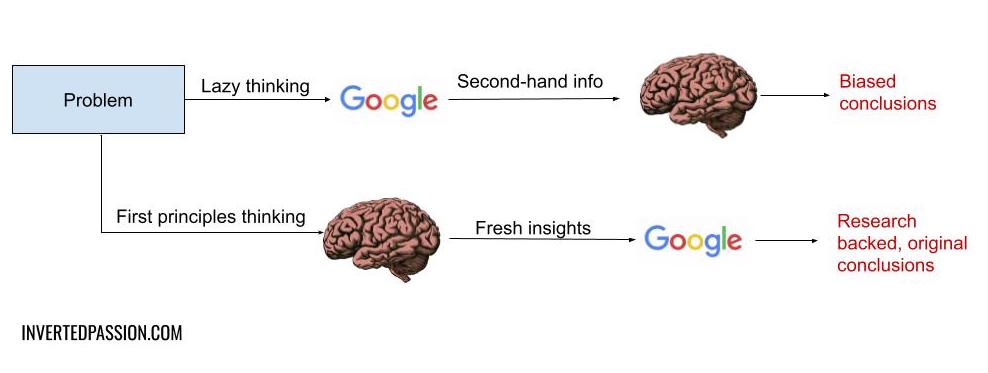Like most technologies, search engines are both good and bad at the same time. They’re good because they open up vast resources of information. Today, our ability to know things instantly would seem like magic to previous generations. At the same time, precisely because searching is so easy, we’ve become habitual for googling for each little problem or doubt in our head.

In programming circles, coding by Googling is popular, but this is equally true for all professions. Because search results are so damn fast and convenient, we are now slowly getting wired to automatically and subconsciously Google any unresolved query in our head. This automatic reliance on search engines is dangerous because it is replacing our capacity for original thinking with second-hand information written by others.
It’s important to note that articles written by others that show up on Google are almost always biased. In fact, all forms of written material (including this book) is biased in some way because authors always end up overemphasizing their favored perspective. (In fact, typically, the opposite view isn’t even mentioned). So, when we google queries like “how to design a landing page” or “how to interview customers” or “how to hire a marketing head”, we get to read a particular point of view of an author.
Even if an article lists best practices, the problem is that such generic advice entirely misses the particular context of your situation. It wouldn’t have mattered if you could rationally consider whether what you read applies to your context, but in practice, our brain doesn’t work that way.
Well-written articles, by definition, convince us that their way is the right way to do things. If you’re reading something that’s well-written, you can’t help getting convinced of the author’s way of doing things. This inevitably leads to wrong conclusions. For example, advice on hiring in an article might be relevant in a particular culture which may be an unsaid assumption, while your culture might be drastically different. Similarly, best practices for designing a landing page might be contextual to SaaS or ecommerce, while you may be selling pharmaceuticals.
Why rely on second hand info when you have a brain of yours? To prevent getting biased, before you Google anything, start with a pen and paper and write down your own analysis and conclusions about the problem at hand.
(And remember to always make a pros/cons list to systematically explore the opposite of your initial solution hunch).
Only after you feel you’ve put enough effort to think by yourself, should you Google. By doing original thinking first, even your research on Google will be better as:
- a) you’d have your particular context prepped up in the mind;
- b) you’d be able to clearly think through whether the suggested solution will work in your context or not.
Remember: the more effort you put in thinking up front, the more nuanced approach you’ll have towards solving the problem. Always approach problems from first principles and only then Google them to incorporate other people’s views.
This essay is part of my book on mental models for startup founders.
Join 200k followers
Follow @paraschopra